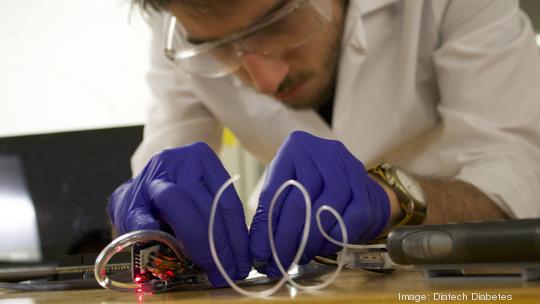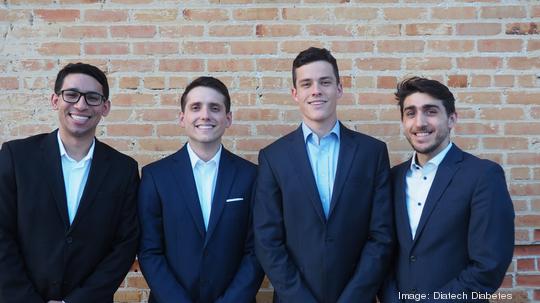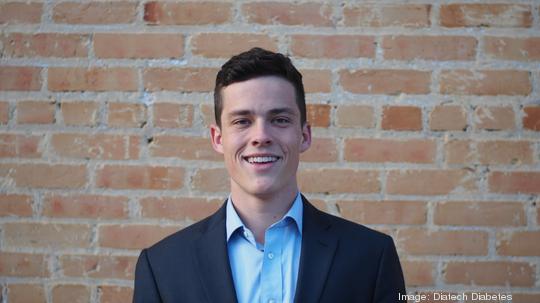
On his ninth birthday, John Wilcox was diagnosed with Type 1 diabetes.
Most days, he’s still able to live a normal, symptom-free life, provided he takes the right amount of insulin. But when enough insulin doesn’t make it into his system, his blood sugar can skyrocket. He feels thirsty and lethargic.
“It can lead to long-term health impacts, and it can also be mentally draining,” he said. “Like, ‘Oh my gosh, my blood sugar is always high. What’s that going to do to my body in 20 years?’”
Through a Memphis-based startup, however, Wilcox is helping develop a software platform — one that could ensure people with diabetes everywhere obtain proper amounts of insulin.
Smart solution
About 16 years after his diagnosis, he’s the CEO and co-founder of Diatech Diabetes, a medical device business that came to the Bluff City in 2019 for the ZeroTo510 Medical Device Accelerator. When he was a student at Florida State University (FSU), Wilcox started the company with Luis Blanco, chief technology officer; Nick Cooper, COO; and John Clark Gray, chief scientific officer.

These days, it’s housed in the UMRF Research Park on South Highland Street, and has just scored a $300,000 grant from the National Institutes of Health (NIH) so it can further develop its initial product, an infusion set failure detection system called SmartFusion.
In the U.S., Wilcox explained, there’s about 600,000 diabetes patients who use insulin pumps — generally those with Type 1 diabetes — which are about the size of a cell phone, and connected to the body via disposable pieces called infusion sets. These pumps are typically found on the stomach and worn around the clock. They regularly inject insulin into the body, ideally ensuring the patients receive the correct amount of insulin.
The margin for error, though, is high, and according to Wilcox, malfunctions happen frequently. For example, if the infusion site on the skin becomes loose, a leakage can cause an under-delivery of insulin. And if the cannula — a thin medical tube — is injected into damaged skin tissue, it can cause blockage, potentially leading to an insulin buildup and overdose.
Just flexing or laying on the pump the wrong way can lead to pump mishaps and malfunctions, too.
“It’s actually a very common occurrence with patients that use these devices, and the outcome can be very severe for the patient,” Wilcox said.
Exacerbating the issue is that often, people don’t realize the root of the problem is the pump’s infusion set. Wilcox can remember being younger, wondering why his blood sugar kept spinning out of control, why the treatment wasn’t working.
“I would feel like it was my fault that I was having this uncontrolled blood sugar,” he said. “When in reality, it was just me experiencing these infusion failures.”

Connecting the disconnect
And this is where Diatech Diabetes' SmartFusion platform comes in.
The goal of the software is to study data in an insulin pump’s system to make analyses and predictions, while also providing alarms that say when a pump is malfunctioning, and insulin dosages aren’t right. Currently, Wilcox explained, most pump systems only alert patients about failures that prevented it from delivering insulin — they don’t tell them if the insulin was delivered, but not properly received.
The hope is that the SmartFusion platform changes this, and Wilcox’s goal is for the software to be purchased by insulin pump manufacturers, who would then integrate it into the pumps they sell to patients.
That, however, is in the future. Right now, with funds from the $300,000 NIH grant, Diatech Diabetes is preparing to begin testing the effectiveness of the product with a preclinical swine model (meaning it will start the research with pigs). It’s operating on a flexible, two-year timeline, and wants to have completed clinical studies and formed a strong relationship with a pump manufacturer by 2023 or 2024.
Meanwhile, Wilcox will continue to be driven in his work by his own experiences as a diabetes patient — and the experiences of others like him.
“Having that disconnect between my therapy, and what really was happening, was something that I remember vividly, and that was something that has helped inspire this,” he said. “But we’re doing this for a lot more than just for me, this is not just my problem."









